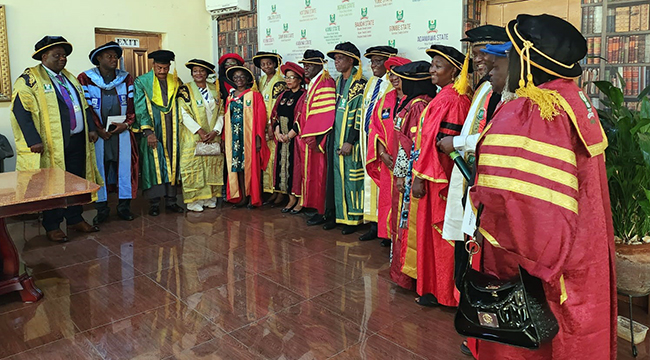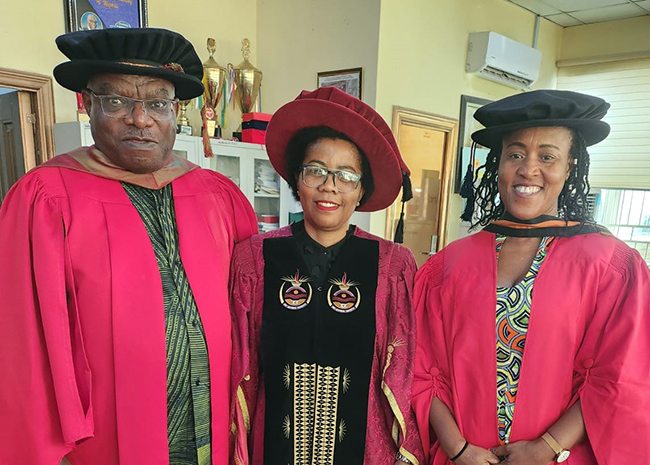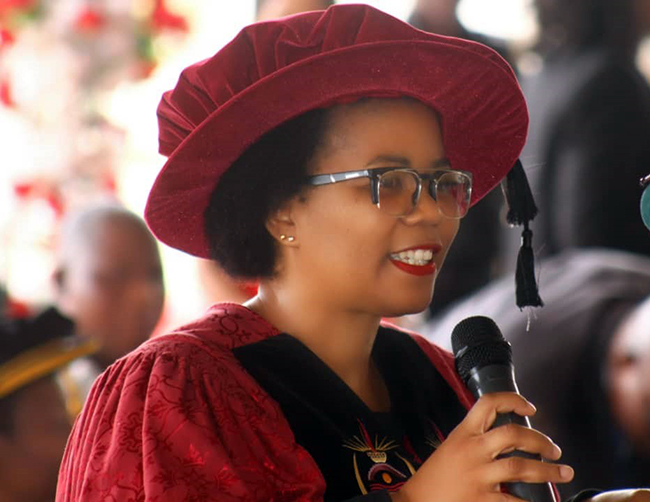News & Events
VC delivers convocation lecture at NOUN, Abuja, Nigeria
Professor Puleng Lenkabula, Principal and Vice-Chancellor of Unisa, recently delivered the 12th Convocation Lecture at the National Open University of Nigeria (NOUN). Led by Professor Olufemi Peters, the university is one of the largest tertiary institutions on the continent in terms of student population. The university headquarters is in the capital city of Abuja and has 108 study centres spread across 38 states of Nigeria. A total of 28740 degrees were conferred at the 12th convocation ceremony.

Unisa and NOUN dignitaries at the 12th Convocation Lecture at NOUN, Abuja, Nigeria
Professor Edith Phaswana from the Thabo Mbeki School of Public and International Affairs and Professor Jimi Adesina from the National Research Foundation SARCHI Chair of Social Policy witnessed the successful running of the NOUN convocation ceremonies. The discussions amongst colleagues from Unisa and NOUN centred around how the two institutions can lead ground-breaking research, teaching and learning and engaged scholarships through open distance e-learning on the continent and worldwide. In addition, the delegation visited the newly built digital university hospital at Baze University and the National Universities Commission, a South African counterpart of the Council of Higher Education (CHE).

From the left: Professors Jimi Adesina, Puleng LenkaBula (VC) and Edith Phaswana
Lenkabula delivered the convocation lecture titled "Volatility and Opportunities in Higher Education." She acknowledged the role of Nigeria in the struggles against the apartheid regime in South Africa and the post-apartheid efforts to build relations between South Africa and Nigeria. In particular, she mentioned Presidents Thabo Mbeki, Olusegun Obasanjo with Abdullahi Wade and Abdelaziz Bouteflika as instrumental in launching the New Partnership for Africa's Development (NEPAD) programme and central in the initiation of the transformation of the Organisation of African Unity (OAU) to the African Union (AU).
The VC underscored Unisa and NOUN as essential institutions in offering access to education anchored on the imperatives of social justice and equity. However, she indicated that universities are constantly open to volatility. She explained volatility as constant disruption in meeting our mandates as open distant institutions. Through what could be described as an optimistic address, Lenkabula suggested that these disruptions need to be understood in the context of the contradictory long meanders of history/herstory. She argued that the continued disruption is caused by what Ngũgĩ wa Thiong'o described as a 'cultural bomb' which fermented the return of the decolonial ethic and politics in the higher education sector in South Africa in the past decade. Students led these struggles through popular mobilisation.

Professor Puleng LenkaBula
LenkaBula highlighted: "Higher education institutions are permanently caught in the tailwind of volatility. The technological context of the offering of our mandate is a constantly evolving process—from students who had to learn at the feet of their instructors in areas from Greece to Sankore to the current challenges that ChatGPT offers for learning and assessment in universities such as ours."
She stressed that the different sources of volatility, especially for public universities, include funding areas. "In some contexts, the reduction of public funding led to the collapse of research culture in some of our universities, with the preference given to commercially attractive course offerings and staff turned to consultancy activities to make ends meet," she said. The VC emphasised that it has taken a herculean task to turn around in recovering the research culture in these universities. She explained: "However, even universities in the more fortunate contexts of public funding face the persistent pressure of financing for research and infrastructural assets of our universities."
Lenkabula further argued: "The COVID-19 pandemic introduced new disruptions to the academic environment. However, Unisa mitigated the challenges by providing computer hardware and data to allow the students access to learning resources and submission of assignments."
She further expressed: "How we mediate exclusion is also an important area that should concern us. We must cast our understanding of exclusion broad to cover epistemic knowledge systems, languages, etc. We require the courage to contest the exclusion of African languages, knowledge systems and epistemes."
Lenkabula said: "We must seriously question ourselves: What does it mean to provide access to students without being concerned with obstacles that lie on their way to success?"
She continued: "The passion of our teachers must allow our institutions to overcome the volatility and apprehend diverse opportunities that will avail themselves to us. African universities must not be dependent on technologies that we do not own and have no control over. The challenge is for us to produce technology over which we have sovereignty."
Summing up her address, Lenkabula shared President Nelson Mandela's quote to underscore the importance of education and widening access: "Education is the great engine of personal development. Through education, the daughter of a peasant can become a doctor, the son of a mine worker can become the head of the mine, and the child of farmworkers can become the president of a great nation. It is what we make out of what we have, not what we are given, that separates one person from another."
In closing, she acknowledged the injunctions of two eminent Nigerian scholars, Professor Adebayo Olukoshi and Professor Amina Mama, on the imperative of social justice in meeting our agenda as higher education and research institutions.
* By Professors Edith Phaswana and Jimi Adesina
Publish date: 2023/03/30
